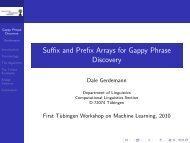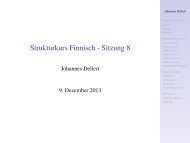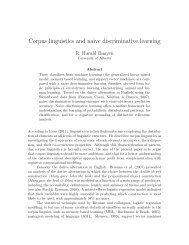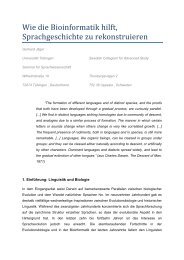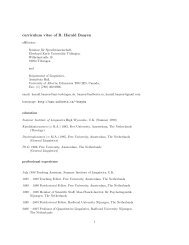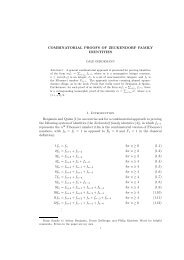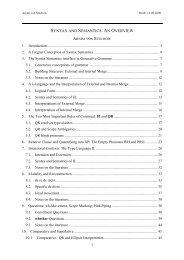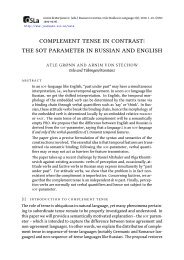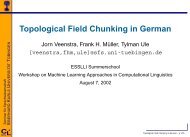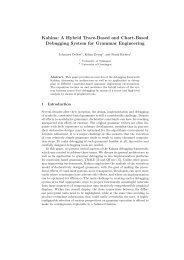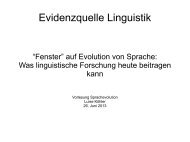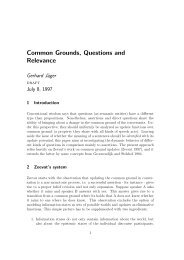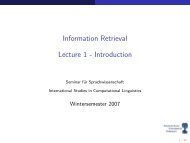A Treebank-based Investigation of IPP-triggering Verbs in Dutch
A Treebank-based Investigation of IPP-triggering Verbs in Dutch
A Treebank-based Investigation of IPP-triggering Verbs in Dutch
Create successful ePaper yourself
Turn your PDF publications into a flip-book with our unique Google optimized e-Paper software.
Portuguese Component A first step <strong>in</strong> the construction <strong>of</strong> the Portuguese part <strong>of</strong><br />
the ParDeepBank consisted <strong>in</strong> obta<strong>in</strong><strong>in</strong>g a corpus <strong>of</strong> raw sentences that is parallel<br />
to the WSJ corpus, on which the PTB is <strong>based</strong>. To this end, the WSJ text was<br />
translated from English <strong>in</strong>to Portuguese. This translation was performed by two<br />
pr<strong>of</strong>essional translators. Each portion <strong>of</strong> the corpus that was translated by one<br />
<strong>of</strong> the translators was subsequently reviewed by the other translator <strong>in</strong> order to<br />
double-check their outcome and enforce consistency among the translators.<br />
Given that the orig<strong>in</strong>al English corpus results from the gather<strong>in</strong>g <strong>of</strong> newspaper<br />
texts, more specifically from the Wall Street Journal, a newspaper specialized<br />
on economic and bus<strong>in</strong>ess matters, the translators were <strong>in</strong>structed to perform the<br />
translation as if the result <strong>of</strong> their work was to be published <strong>in</strong> a Portuguese newspaper<br />
<strong>of</strong> a similar type, suitable to be read by native speakers <strong>of</strong> Portuguese. A<br />
second recommendation was that each English sentence should be translated <strong>in</strong>to<br />
a Portuguese sentence if possible and if that would not clash with the first recommendation<br />
concern<strong>in</strong>g the “naturalness” <strong>of</strong> the outcome.<br />
As the Portuguese corpus was obta<strong>in</strong>ed, it entered a process <strong>of</strong> dynamic annotation,<br />
analogous to the one applied to the Redwoods treebank. With the support <strong>of</strong><br />
the annotation environment [<strong>in</strong>cr tsdb()] [21], the Portuguese Resource Grammar<br />
LXGram was used to support the association <strong>of</strong> sentences with their deep grammatical<br />
representation. For each sentence the grammar provides a parse forest; the<br />
correct parse if available, can be selected and stored by decid<strong>in</strong>g on a number <strong>of</strong> b<strong>in</strong>ary<br />
semantic discrim<strong>in</strong>ants that differentiate the different parses <strong>in</strong> the respective<br />
parse forest.<br />
The translation <strong>of</strong> the WSJ corpus <strong>in</strong>to Portuguese is completed, and at the time<br />
<strong>of</strong> writ<strong>in</strong>g the present paper, only a portion <strong>of</strong> these sentences had been parsed and<br />
annotated. While this is an ongo<strong>in</strong>g endeavor, at present the Portuguese part <strong>of</strong> the<br />
ParDeepBank <strong>in</strong>cludes more than 1,000 sentences.<br />
The sentences are treebanked resort<strong>in</strong>g to the annotation methodology that has<br />
been deemed <strong>in</strong> the literature as better ensur<strong>in</strong>g the reliability <strong>of</strong> the dataset produced.<br />
They are submitted to a process <strong>of</strong> double bl<strong>in</strong>d annotation followed by<br />
adjudication. Two different annotators annotate each sentence <strong>in</strong> an <strong>in</strong>dependent<br />
way, without hav<strong>in</strong>g access to each other’s decisions. For those sentences over<br />
whose annotation they happen to disagree, a third element <strong>of</strong> the annotation team,<br />
the adjudicator, decides which one <strong>of</strong> the two different grammatical representations<br />
for the same sentence, if any, is the suitable one to be stored. The annotation team<br />
consists <strong>of</strong> experts graduated <strong>in</strong> L<strong>in</strong>guistics or Language studies, specifically hired<br />
to perform the annotation task on a full time basis.<br />
Bulgarian Component Bulgarian part <strong>of</strong> ParDeepBank was produced <strong>in</strong> a similar<br />
way to the Portuguese part. First, translations <strong>of</strong> WSJ texts were performed <strong>in</strong><br />
two steps. Dur<strong>in</strong>g the first step the text was translated by one translator. We could<br />
not afford pr<strong>of</strong>essional translators. We have hired three students <strong>in</strong> translation studies(one<br />
PhD student and two master students study<strong>in</strong>g at English Department <strong>of</strong> the<br />
104



